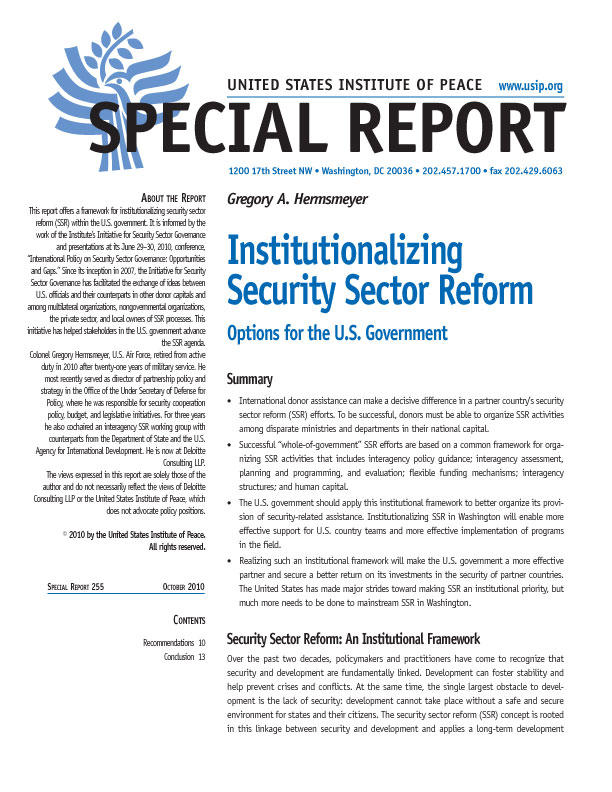This report offers a framework for institutionalizing security sector reform (SSR) within the U.S. government. It is informed by the work of the Institute’s Initiative for Security Sector Governance and presentations at its June 29–30, 2010, conference, “International Policy on Security Sector Governance: Opportunities and Gaps.”

Summary
- International donor assistance can make a decisive difference in a partner country’s security sector reform (SSR) efforts. To be successful, donors must be able to organize SSR activities among disparate ministries and departments in their national capital.
- Successful “whole-of-government” SSR efforts are based on a common framework for organizing SSR activities that includes interagency policy guidance; interagency assessment, planning and programming, and evaluation; flexible funding mechanisms; interagency structures; and human capital.
- The U.S. government should apply this institutional framework to better organize its provision of security-related assistance. Institutionalizing SSR in Washington will enable more effective support for U.S. country teams and more effective implementation of programs in the field.
- Realizing such an institutional framework will make the U.S. government a more effective partner and secure a better return on its investments in the security of partner countries. The United States has made major strides toward making SSR an institutional priority, but much more needs to be done to mainstream SSR in Washington.
About the Report
This report offers a framework for institutionalizing security sector reform (SSR) within the U.S. government. It is informed by the work of the Institute’s Initiative for Security Sector Governance and presentations at its June 29–30, 2010, conference, “International Policy on Security Sector Governance: Opportunities and Gaps.” Since its inception in 2007, the Initiative for Security Sector Governance has facilitated the exchange of ideas between U.S. officials and their counterparts in other donor capitals and among multilateral organizations, nongovernmental organizations, the private sector, and local owners of SSR processes. This initiative has helped stakeholders in the U.S. government advance the SSR agenda.
Colonel Gregory Hermsmeyer, U.S. Air Force, retired from active duty in 2010 after twenty-one years of military service. He most recently served as director of partnership policy and strategy in the Office of the Under Secretary of Defense for Policy, where he was responsible for security cooperation policy, budget, and legislative initiatives. For three years he also cochaired an interagency SSR working group with counterparts from the Department of State and the U.S. Agency for International Development. He is now at Deloitte Consulting LLP.
The views expressed in this report are solely those of the author and do not necessarily reflect the views of Deloitte Consulting LLP or the United States Institute of Peace, which does not advocate policy positions.